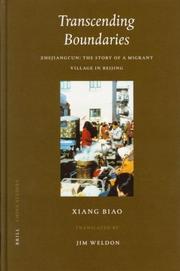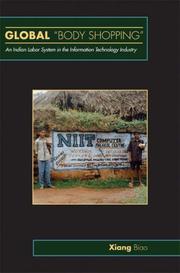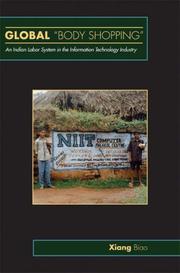| Listing 1 - 10 of 12 | << page >> |
Sort by
|

ISBN: 9004142010 9786610867455 1429452587 9047406796 1280867450 1433707608 Year: 2005 Volume: 5 Publisher: Leiden ; Boston : Brill,
Abstract | Keywords | Export | Availability | Bookmark
 Loading...
Loading...Choose an application
- Reference Manager
- EndNote
- RefWorks (Direct export to RefWorks)
Based on the author's own six years' fieldwork, this book looks at critical features of China's current social change, recounting how, against the odds, a group of migrants created their own major community outside of the State system and looking at that communities' interaction with the State.
S11/1080 --- S03/0631 --- S11/0470 --- China: Social sciences--Migration inside China --- China: Geography, description and travel--Beijing (incl. concessions) --- China: Social sciences--Cities: since 1949 --- Migration, Internal --- Internal migration --- Mobility --- Population geography --- Internal migrants --- Beijing (China) --- Zhejiangcun (Beijing, China) --- Zhejiang Village (Beijing, China) --- Description and travel. --- Description and travel --- Migration [Internal ] --- China

ISBN: 1280867450 9786610867455 1429452587 9047406796 1433707608 9781429452588 9004142010 9789004142015 9781280867453 6610867453 9789047406792 9781433707605 Year: 2005 Publisher: Leiden Boston Brill
Abstract | Keywords | Export | Availability | Bookmark
 Loading...
Loading...Choose an application
- Reference Manager
- EndNote
- RefWorks (Direct export to RefWorks)
This book sheds new light on state-society relations in contemporary China by demonstrating how rigid official boundaries internal to the state system, which were essential for the state's control over society, have paradoxically facilitated the growth of new social spaces. Based on long years of fieldwork, the book takes us to a highly unlikely site in Beijing - Zhejiangcun (literally 'Zhejiang village'), the biggest migrant community in China, located only five kilometres south of Tian'anmen Square -- where 100,000 migrants, mostly from Wenzhou, have organised a vibrant garment industry despite regular state crackdowns. It documents the spontaneous evolution of Zhejiangcun into a hub of nationwide migrant business networks transcending officially imposed boundaries. The book also makes use of Chinese folk insights and philosophical traditions as analytical tools for tackling fluid social relationships unconfined to physical space.
Migration, Internal --- Internal migration --- Mobility --- Population geography --- Internal migrants --- Zhejiangcun (Beijing, China) --- Beijing (China) --- Zhejiang Village (Beijing, China) --- Description and travel. --- Migration --- Travel --- Traveling --- Travelling --- Tourism --- Voyages and travels

ISBN: 9786613101471 1400836336 1283101475 9781400836338 9780691118512 0691118515 9780691118529 0691118523 9781283101479 Year: 2007 Publisher: Princeton, N.J. : Princeton University Press,
Abstract | Keywords | Export | Availability | Bookmark
 Loading...
Loading...Choose an application
- Reference Manager
- EndNote
- RefWorks (Direct export to RefWorks)
How can America's information technology (IT) industry predict serious labor shortages while at the same time laying off tens of thousands of employees annually? The answer is the industry's flexible labor management system--a flexibility widely regarded as the modus operandi of global capitalism today. Global "Body Shopping" explores how flexibility and uncertainty in the IT labor market are constructed and sustained through concrete human actions. Drawing on in-depth field research in southern India and in Australia, and folding an ethnography into a political economy examination, Xiang Biao offers a richly detailed analysis of the India-based global labor management practice known as "body shopping." In this practice, a group of consultants--body shops--in different countries works together to recruit IT workers. Body shops then farm out workers to clients as project-based labor; and upon a project's completion they either place the workers with a different client or "bench" them to await the next placement. Thus, labor is managed globally to serve volatile capital movement. Underpinning this practice are unequal socioeconomic relations on multiple levels. While wealth in the New Economy is created in an increasingly abstract manner, everyday realities--stock markets in New York, benched IT workers in Sydney, dowries in Hyderabad, and women and children in Indian villages--sustain this flexibility.
Labor mobility --- Electronic data processing personnel --- Mobility, Labor --- Migration, Internal --- Labor supply --- Labor turnover --- Computer industry --- Employees --- India --- Emigration and immigration.

ISBN: 9781400836338 9780691118529 1400836336 9780691118512 0691118515 0691118523 Year: 2007 Publisher: Princeton, N.J. Princeton University Press
Abstract | Keywords | Export | Availability | Bookmark
 Loading...
Loading...Choose an application
- Reference Manager
- EndNote
- RefWorks (Direct export to RefWorks)
Book
ISBN: 9811949530 9811949522 Year: 2023 Publisher: Singapore Springer Nature
Abstract | Keywords | Export | Availability | Bookmark
 Loading...
Loading...Choose an application
- Reference Manager
- EndNote
- RefWorks (Direct export to RefWorks)
Despite China’s rise to the status of global power, many Chinese youths are anxious about their personal future, in large measure because the rapid changes have left them feeling adrift. This book, available in open access, provides a manifesto of intellectual activism that counsels China’s young people to think by themselves and for themselves. Consisting of three conversations between Xiang Biao, a social anthropologist, and Wu Qi, a rising journalist, the book probes how China has reached its current stage and how young people can make changes. The conversations touch on issues of mobility, education, family, relations between the self and the authority, centers and margins, China, and the world. The Chinese version was named the “most impactful book of 2021” by Douban, China’s premier website for rating books, films, and music. The English version is translated by David Ownby, who also penned an introduction. Xiang Biao is a social anthropologist who was born and educated in China and now the director of the Max Planck Institute for Social Anthropology. Wu Qi is a journalist and an editor of ‘One Way Street,’ a Chinese literary magazine. David Ownby is a full professor, Department of History, Centre d’études de l’Asie de l’Est, Université de Montréal.
Political science—Study and teaching. --- China—History. --- Globalization. --- Political Education. --- History of China. --- Global cities --- Globalisation --- Internationalization --- International relations --- Anti-globalization movement --- China --- Development --- Political --- Chinese Intellectual Life --- Intellectual
Book
ISBN: 9789811949531 9811949530 Year: 2023 Publisher: Singapore : Springer Nature Singapore : Imprint: Palgrave Macmillan,
Abstract | Keywords | Export | Availability | Bookmark
 Loading...
Loading...Choose an application
- Reference Manager
- EndNote
- RefWorks (Direct export to RefWorks)
Despite China's rise to the status of global power, many Chinese youths are anxious about their personal future, in large measure because the rapid changes have left them feeling adrift. This book, available in open access, provides a manifesto of intellectual activism that counsels China's young people to think by themselves and for themselves. Consisting of three conversations between Xiang Biao, a social anthropologist, and Wu Qi, a rising journalist, the book probes how China has reached its current stage and how young people can make changes. The conversations touch on issues of mobility, education, family, relations between the self and the authority, centers and margins, China, and the world. The Chinese version was named the "most impactful book of 2021" by Douban, China's premier website for rating books, films, and music. The English version is translated by David Ownby, who also penned an introduction. Xiang Biao is a social anthropologist who was born and educated in China and now the director of the Max Planck Institute for Social Anthropology. Wu Qi is a journalist and an editor of 'One Way Street,' a Chinese literary magazine. David Ownby is a full professor, Department of History, Centre d'études de l'Asie de l'Est, Université de Montréal.
Political science --- China --- Globalization. --- Political Education. --- History of China. --- Study and teaching. --- History.
Book
ISBN: 9780822355168 0822355167 9780822355311 0822355310 0822377470 1299870341 Year: 2013 Publisher: Durham : Duke University Press,
Abstract | Keywords | Export | Availability | Bookmark
 Loading...
Loading...Choose an application
- Reference Manager
- EndNote
- RefWorks (Direct export to RefWorks)
Since the late 1990s, Asian nations have increasingly encouraged or demanded the return of emigrants. In this anthology, cases of return migration in Asia provide the ground for rethinking relations between nation-states and transnational mobility.
Return migration --- #SBIB:39A6 --- #SBIB:39A75 --- Migration, Return --- Emigration and immigration --- Repatriation --- Etniciteit / Migratiebeleid en -problemen --- Etnografie: Azië --- Asia --- Asian and Pacific Council countries --- Eastern Hemisphere --- Eurasia --- Emigration and immigration. --- History --- China --- India --- Japan --- Overseas Chinese --- United States
Book

ISBN: 9780824847746 Year: 2014 Publisher: Honolulu
Abstract | Keywords | Export | Availability | Bookmark
 Loading...
Loading...Choose an application
- Reference Manager
- EndNote
- RefWorks (Direct export to RefWorks)
Book

ISBN: 9781978815667 Year: 2021 Publisher: New Brunswick, NJ
Abstract | Keywords | Export | Availability | Bookmark
 Loading...
Loading...Choose an application
- Reference Manager
- EndNote
- RefWorks (Direct export to RefWorks)
Multi

ISBN: 9780824847746 9780824839949 Year: 2014 Publisher: Honolulu, Hawaii University of Hawaii Press
Abstract | Keywords | Export | Availability | Bookmark
 Loading...
Loading...Choose an application
- Reference Manager
- EndNote
- RefWorks (Direct export to RefWorks)
| Listing 1 - 10 of 12 | << page >> |
Sort by
|

 Search
Search Feedback
Feedback About UniCat
About UniCat  Help
Help News
News